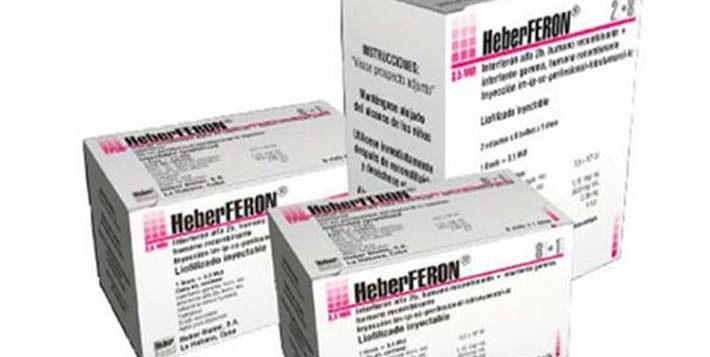
Cuban medicine HeberFERON found to be effective against skin cancer
SANCTI SPÍRITUS – The Cuban drug HeberFERON, developed by specialists from the island, has been confirmed to be an effective treatment against basal carcinoma, the most frequent disease associated with skin cancer and on the increase globally.
After two years of use in Cuba, the HeberFERON test results found nationally were deemed more than satisfactory for the treatment and prevention of this condition. For example, in the Cuban province of Sancti Spíritus, where almost a hundred patients have been treated since the clinical trials began, the results of its efficacy were confirmed, according to Dr. Vladimir Sánchez, a specialist in Dermatology.
The drug, administered in several doses subcutaneously, enables the reduction of the tumor mass and the healing of lesions thanks to the combination of two products: the Interferon Alfa 2 b with human Gamma, produced by the Center for Genetic Engineering and Biotechnology (CIGB) based in Havana.
Research shows that the medicine obtains a faster and longer response than by separation of the interferons, helping to avoid complex surgeries in areas of high frequency of recurrences such as the ears, nose, eyelids and periocular area, as well as its sequelae.
Basal carcinoma is a growing condition in Cuba and around the world because it is directly related to atmospheric factors, explains Dr. Sánchez. The damage in the ozone layer and the incidence of ultra violet rays affects Cuba even more because of it’s geographical location nearer to the equator. He emphasized that the therapy presented by HeberFERON is very effective, especially when you compare it to the expensive treatments that are used today around the world as an alternative to surgeries for this type of ailment.
This condition is compounded by the unfavorable increase in the number of patients with these conditions, especially in young people between the ages of 25 and 35.
Medical literature tells us that among the main causes of basal carcinoma are exhaustive exposure to solar radiation, together with factors such as genetics, viruses, or exposure to chemicals such as arsenic.
With the HeberFeron we are avoiding mutilation and therefore the patient’s aesthetic response will be more favorable than a surgery. In that sense it affects the patient less and also offers social and psychological benefits, adds Dr. Sánchez.
A province with proven results
Since 2017, a multidisciplinary group of medical specialists from Sancti Spíritus, led by Dr. Vladimir Sánchez, have been working on the detection of patients with basal carcinoma where HeberFERON can be used to treat them. This was one of the first provinces to conduct the clinical trial, taking into account the incidence of skin cancer found in the area — with one of the highest numbers of patients diagnosed each year.
“By January 2017, more than 60 cases of basal carcinoma had been detected and treated with the drug in during the clinical trial phase, that is, before incorporating the product into the basic drugs offered,” said the Doctor.
The specialist points out that of this initial group, more than half had a complete reversal; that is, they did not need surgery, while the rest had a partial response, which facilitated the operation of the injury.
Dr. Sánchez explains that in general surgery continues to be more effective for the eradication of skin lesions of this type, however, this treatment is considered suitable to avoid surgeries in areas such as the ears, nose, eyelids as well as their sequelae.
Scholars of the malady recognize other advantages such as its curative effect on other lesions close to the one being treated. When injected into a lesion others in the area are reduced in size or eliminated, which inhibits the vascularity of the tumor and controls the cell cycle.
Until January of this year in the province of Sancti Spíritus 89 patients of basal carcinoma have been treated with HeberFERON, 52 have had complete reversal and the rest have responded partially, he explains. Some of them have received a second cycle of the drug in search of a complete cure, he adds, and with the rest of the cases we were able to achieve a much less invasive surgery.
A unique solution
According to the researcher, the drug developed by the CIGB is a scientific novelty not only in Cuba, but also with other therapeutic modalities that exist around the world.
“HeberFERON has come to revolutionize the treatment of skin cancer, specifically of basal carcinoma, since any subtype can be treated, in any location and of any size,” he says.
Although there are other therapeutic modalities, it is a one of a kind drug in the world. In Cuba, until recently, only surgery and superficial radiotherapy were used in addition to chemotherapy, but that is more specific for oncologists, he points out.
According to Dr. Sánchez, the fundamental importance of the medication is not to apply it to any patient that comes with a basal carcinoma because the treatment of choice is still surgery. However, he says, this represents a very useful therapeutic variant for elderly people, others that have already been operated on before and the tumor reappears, or in those that present lesion of more than three centimeters.
He adds that patients in Cuba currently can access treatment from a primary care physician, which allows treatment to a significant number of them on an outpatient basis.
Studies show that with HeberFERON skin cancer can be curable with complete reversal in most cases, and more than satisfactory results with the rest, Dr. Sanchez concludes.
(From Prensa Latina)
Translation by Progreso Weekly.

